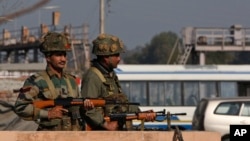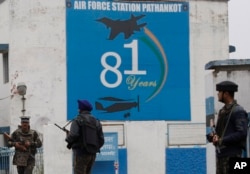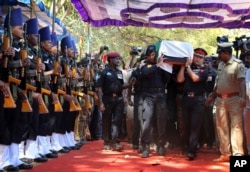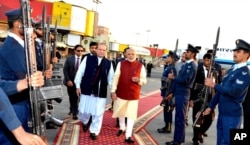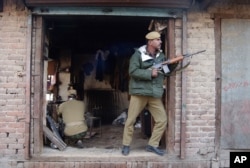New Delhi has welcomed Pakistan’s offer to send a special team to help India in its investigation of a deadly attack at an Indian air-force base in a sensitive border area.
A spokesperson for the Ministry of External Affairs in the Indian capital, Vikas Swarup, said the actions Pakistan already has taken, including rounding up members of a banned militant group, are "an important first step" in the investigations.
Pakistan's cooperation, together with information India has already gathered, amounts to "considerable progress" in the investigation, Swarup said Thursday. "We look forward to the visit [of Pakistan's special investigation team] and our investigative agencies will extend all necessary cooperation to bring the perpetrators of this attack to justice."
India says it has shared information with Pakistan about the Pathankot attack, including the telephone numbers of the “handlers” who were directing the team attacking the air base.
Pakistan and India's top diplomats were due to meet on Friday in Islamabad, Swarup said, but both sides agreed to postpone those talks until some time in the "very near future."
Pakistan says it has detained several members of the banned militant organization Jaish-e-Mohammad, which India blames for the attack on its Pathankot air force base, 50 kilometers from the Pakistani border. Seven Indian soldiers died in the January 2 attack.
Diplomatic engagement
The reaction from both India and Pakistan to the Pathankot attack indicates both governments are determined to stay engaged in diplomatic contacts, VOA reporters said, in contrast to a lengthy period of tension between the neighbor states that followed a terror attack on India's financial capital, Mumbai, seven years ago.
The difference this time around, according to Pakistani author and journalist Zahid Hussain, is that Islamabad has not issued an automatic denial of any possible involvement in an attack across the border in India.
“Some senior officials actually concede that militants could have sneaked across the border,” Hussain wrote in Pakistan’s Dawn newspaper.
Former Indian foreign secretary Kanwal Sibal said, “Frankly, I didn’t expect that Islamabad would act so quickly.”
He credited Indian Prime Minister Narendra Modi’s dramatic visit to Lahore in December, as well as previous engagements between the two countries at international meetings at Ufa in Russia and in Bangkok, for the change in Pakistan’s behavior.
The former senior diplomat also acknowledged a “great desire” on the part of the Pakistani Prime Minister Nawaz Sharif not to miss an opportunity to renew dialogue with India.
Resumption of dialogue
Indeed, most analysts said the resumption of formal dialogue between the two nuclear-armed nations seemed to be key to Pakistan's quick reaction to the terrorist situation this month in India, in contrast to previous attempts to ease bilateral tensions through negotiations. India and Pakistan have fought three major wars since 1947, when colonial rule by Britain ended and they became independent.
“Pakistanis see [the current] negotiations as something that’s in their interest, and they don’t want this attack to completely derail the process,” said Daniel Markey, adjunct senior fellow for India, Pakistan, and South Asia at the Council on Foreign Relations, the Washington-based think tank.
Journalist Hussain credited the current leaders of Pakistan's military services for a change in outlook. The Pakistani army chief, General Raheel Sharif, has taken “a very decisive position” against terrorism, he said.
'Forces of disruption'
However, Thomas Lynch, a distinguished research fellow at the National Defense University in Washington and a former special assistant to the Chairman of the Joint Chiefs of Staff, which commands all U.S. armed forces, cautioned against being too optimistic too soon.
Lynch said observers in Washington saw the “forces of disruption (in Pakistan) as strong as if not stronger than anytime in the last 15 years.”
Shelling and mortar fire across the Line of Control, a de-facto border between Indian and Pakistani forces in the disputed region of Kashmir, has been higher than usual during the last 18 to 20 months. Lynch said such shellfire usually accompanied the infiltration of militants into Indian-administered Kashmir, followed by a militant action days or weeks later.
Lynch said the pattern of militants' infiltration followed by violence “looks a lot like Pakistan help[s] facilitate militants from its side of the border to get more and more engaged" in Indian Kashmir. And such activity generally spikes, he said, anytime Pakistan’s civilian government tried to reach out to India.
The Pakistani military has tried to dispel this impression. In late 2014 it took a group of journalists to areas near Sialkot, bordering Jammu in Indian Kashmir, to show how difficult it was to infiltrate from there.
Pakistan-based political and security analyst Nasim Zehra said the view that Pakistan tolerated or encourages militants' infiltration was outdated "past baggage." Within Pakistan, he said, no one doubted that the civilian government and the military were "on the same page” - in agreement - on cross-border security issues.
Sibal, the former Indian foreign secretary, conceded that Pakistan's reaction to this month's attack in India was different from the way Islamabad handled the regional crisis over the carnage in Mumbai, and more recent attacks in India. However, he said, India wanted to eliminate completely the threat posed by militants.
Even if the militants' operational capacity is checked by security roundups and other action across the border, India feels there is a continuing problem as long as they exist.




